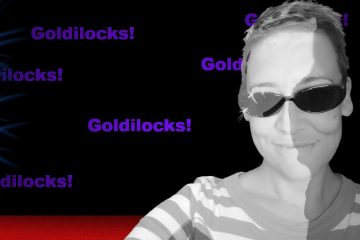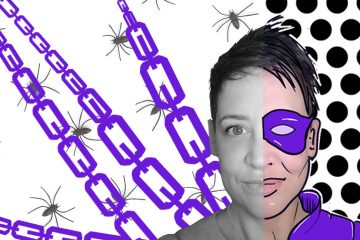If I wasn’t comfortable in a situation, be it in a job, a relationship or a living arrangement (you name it), I’d run. Anything that meant I’d have to confront something about myself that made me even the slightest bit uneasy, I’d pass. I don’t mean I’ve slowly backed away and deftly deflected or changed the conversation. I mean I’ve turned and Usain Bolt-ed, often with tears streaming down my face, screaming, ‘No thanks, not doing this!’
Who I am now can tell you it’s because of an instinctive fear of vulnerability. This fear stems from an inherent tendency to equate vulnerability with loss of independence. As I entered my 20s, I’d just recovered from (and put my family through) one of the scariest experiences of my life. Yet, rather than stick around, face the consequences and work through why I’d stopped taking my medication, I ran. In fact, I ran to Australia, about as far as I could get.
I didn’t want to hang around to identify the emotions that prompted me to stop my medication. That would have been hard; it would have been messy; it would mean being vulnerable. There was no way I could do that; so, instead, I got angry, with the wrong people. And in 2000, as I’d boarded the plane at Heathrow, I gave a symbolic f*ck-you to, well, pretty much everything.
Travelling In a Fried Out Kombi
My best mate (J.) and I left for Australia with 1-year work visas stamped in our passports, but (deep-down) I knew I wasn’t gonna be returning within that timeframe. We flew into Cairns as the jacaranda trees were blooming their magnificent purple blossoms. We spent 3 months cruising down the east coast towards Sydney, with a stay in Brisbane and epilepsy didn’t really interfere. I took my meds; the experience I’d just endured (though not a memory) was too much of a lightning-bolt not to. Despite my apparent bravado and abrupt exit from the UK, I’d found being out-of-it for 9ish months had changed things.
After several months in Sydney, J. and I decided to separate, we had 3 months left to travel; he wanted to stay, and I wanted to see more. I’d found a door-to-door sales company that employed backpackers, placed them in teams, and sent them all over Australia. I arrived at a suburban train station in Melbourne. C. (who was charming, with a great smile) collected me.
6-months later, I married him.
I had a generalised seizure in front of C., and I knew I’d found a good guy; the right guy. We were in Melbourne. I was laying on the bed, he was in the lounge, and he heard a noise he couldn’t place. I ‘came to’; C. had placed a pillow under my head and was telling me I was going to be okay. He hadn’t panicked. He hadn’t called an ambulance, C. was taking things in his stride and caring for me. I hated it.
Me, a strong, independent woman, seen at my most vulnerable? The fact we were married and planned to spend the rest of our lives together (maybe even have a family) didn’t matter. Yes, it’s illogical, irrational and unreasonable, that’s irrelevant. I don’t need his or anyone else’s help. Except, of course, I do. It’s a fear of vulnerability that makes it difficult to accept this kind of unconditional giving. And asking for help, forget that.
Denial is Downunder
In 2006, C. and I split (for entirely unrelated reasons), and I thought of returning to the UK. I could definitely see the upside. My family was there, and I was missing out on all the ‘milestones’, as they were missing mine. Of course, I swiftly rejected the notion, well, it was more of a ‘Nope. Still don’t wanna face any of that sh*t, thanks’. So, I moved on, I found a better job, a new place to live and started again.
I lived in Australia for 12 years and shared that I have epilepsy on a need-to-know basis, usually after people found me convulsing on the floor. Back then it didn’t seem strange not to share the big picture with people whom I cared about and loved. However, it did change the way I formed relationships and the relationships themselves. No one ever got to know the real me.
I was sharing with Roomie, at the Docklands in Melbourne. We met through the hotel where we worked, and it started as a convenient, house-share-money-saving-type-thing. 4 years later despite knowing more than a little about each other, we were still good mates and chose to continue sharing. I figured that because we were living together, I should let her in on the ‘big secret’. Of course, it didn’t faze her at all, why should it?
The 20-something culture in Australia back then was (as I’m sure it is now) ‘there’s a pub open somewhere; we just have to look’. I worked shifts which meant I would either get to the pub late and sleep-in or get to the pub early and leave early (which usually became drinking through until my shift started). Those people didn’t know, they couldn’t know about the condition. We just went to work, to the pub, drank, snorted lines, to the club, drank, popped pills, slept, repeat.
Melbourne’s Answer to Widow Twanky
Towards the end of my 20s, the generalised seizures started to disappear, and nocturnal seizures became more prevalent. It was something of a relief, seizures which happen at night were way easier to hide. As a 20-something (as a 40-something), the hardest thing about this pesky condition is the absence of control. To be a grown-ass woman and pee yourself (never mind pee yourself in public) is horrendous. It’s hard to deny you have an issue when your body is supplying the visible, stinking and soggy evidence for everyone to see.
While sharing with Roomie, I’d wake up most mornings and have wet the bed, and I couldn’t let her find out. I began sleeping on towels. I was too proud to ask for help, too insecure about talking to anybody and too dumb to realise there are several products on the market which could’ve solved my pee problem. Not me. I came up with a 2-point-plan. 1. buy a sh*t-ton of towels, and 2. do a shedload of laundry, constantly. I was Melbourne’s answer to Widow Twanky.
I could have walked into a pharmacy and bought incontinence underwear, just like I do now. There are only a few people who know I buy them; know I wear them and know that on occasion I fill them. Nobody gives a monkeys what undies I’ve got on. When was the last time you thought to yourself, ‘I wonder if that person is wearing incontinence underwear?’
(Really? Be honest now.)
Anger Destroys Everything
I moved in with my boyfriend, and it wasn’t as easy to hide. I was too stubborn and too angry to confess I may have had an issue. Yet, there are only so many times a person can have a seizure next to someone, wake up having wet themselves and not expect the other person to a). notice, or b). want to talk about it. There were only so many times I could ask him to accept doing the horizontal tango with me would mean occasionally waking up drowning in my pee.
Perhaps ‘drowning’ is an overstatement. Well, it seems reasonable, ‘occasionally’ is an understatement. It wasn’t sexy. It made us both feel sh*t and more than a little weirded out. He couldn’t be angry because I couldn’t help it; I was angry because I couldn’t help it. I just wanted him to be at least a little annoyed – then we could fight. If we did that, I could shout, scream and throw stuff. I could blame him. But he was incredibly understanding.
B*stard.
He knew I had epilepsy; he was one of the few people in Australia I had told. But he didn’t know the full severity of the condition or how it affected me. He knew what happened physically. However, in that I hadn’t accepted what was going on emotionally, there was no way he could. And if he did try and start a conversation along those lines, I’d shut him down. I’d suggest we go to the pub. It was messed up. No, worse than that: I was messed up, and I didn’t know it.
Gonna Have to Bite The Bullet
I was furious with myself for having a condition I couldn’t control. I was too pig-headed to ask for help and too lost to see that. Rather than just come clean about how terrified I was, I ran. I filed our relationship in the too-hard basket and bolted. My ever-present fear of vulnerability was devouring me. My seizures were changing again. The nocturnal episodes had now been joined by flurries of fantastic, fascinating and frightening daytime events I couldn’t describe. The docs had prescribed new drugs to be taken alongside the old drugs, and the situation deteriorated.
As much as I hated to admit it, I needed my family, and 12 years after I fled the UK and my family because of epilepsy, I returned to the UK and my family because of epilepsy. I felt like a failure, a loser; worst of all, most of all, I felt small. In practical terms, it was a tough move; hard because I had next-to-no money and nowhere to live. And a tougher move because I was relying solely on the family bond to get the help I needed. It meant admitting my vulnerability.
I’d all but ignored these people. I’d had to. They represented the dark, black cloud filled history I’d gone to Australia to forget. I left the UK determined to see the world, adamant I was going to have experiences like any other girl in her 20s. Now, I was there again, disappointed, desperate, destroyed by a disease I couldn’t control and didn’t accept.
For me, the emotional connection of family is an important and strong one. They greeted me at Heathrow Airport with a welcome-home banner and huge smiles. I was back in the place it had started, away from the fairy-tale my life in Australia has become, now.
What Puts The ‘Ape’ in Apricot?!
I’ve written before about the work I’ve done on myself to accept that I have epilepsy, what I’ve left out is, well, what’s in this post. I denied I had epilepsy because it makes me vulnerable, and I innately detest being vulnerable. When I have a seizure, I feel exposed, and that’s frightening. It feels as though I lose my independence. It’s like being told by an invisible force, ‘I can’t manage or cope on my own’. Yet, every week I post personal stories (like this one), that is the ultimate act of vulnerability and strength; the 2 go hand-in-hand.
To paraphrase Brené Brown, vulnerability is not synonymous with weakness, it’s our most significant measure of courage. Similarly, asking for help is having the nerve to hold up your hand and say, ‘I’m gonna need some support, please’. And those people who respond, and people always do, they’re the people who love me and whom I love.
Everyone who has ever had a significant impact on, or proved to be important in, my life has accepted me; not ‘in spite’ of epilepsy, not ‘regardless’ of epilepsy but because of me. That’s not arrogance. I don’t have an over-inflated ego (on this occasion); it’s the truth.
And this isn’t just the case for me; it’s just the way it is.
Because having epilepsy is like being Goldilocks: you can’t have too much, you can’t have too little; everything has to be just right.
Copyright © Jo Mackenzie 2020



2 Comments
david · August 24, 2020 at 9:23 AM
This is very interesting! Thanks, Goldilocks for writing it.
Hillarie Higgins · August 24, 2020 at 10:53 AM
What a wonderful read! It was as if my own brain sat down and started a blog post without me (in terms of “general theme/messaging”. 😂
Epilepsy is a very scary and life-threading neurological issue but it’s so important to not allow a chronic illness to in any way define us. We live in SPITE of epilepsy! 💪🥰